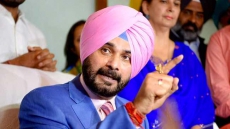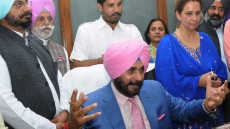It was Jawaharlal Nehru's accomplishment, as the leader of India for its first 17 years of Independence, to make an inclusive national consciousness a daily experience for Indians as the legacy of modern India, renowned novelist and writer Nayantara Sahgal said on Saturday.
Sahgal, 91, made the remarks while delivering the keynote address at a conclave on 'Nehru's legacy: Its relevance to contemporary India', organised by a retired civil servants' collective Constitutional Conduct Group. She expressed her viewpoint on the first Indian Prime Minister's government and outlook.
"As a political creation, modern-day India dates from 1947, when this subcontinent became a singular political entity for the first time in its history. The Congress that came to power had been the first political formation to demand political independence from British rule and to build a country-wide movement under Gandhi to fight for it.
"Allegiance to that movement and active participation spread across region, religion, class, language and gender. And its inclusiveness gave the movement its unique character," she said.
Referring to Mahatma Gandhi as the architect of "this first national consciousness and unity", Sahgal, Nehru's niece and Vijaya Lakshmi Pandit's second daughter, said Nehru took this consciousness forward and made it an everyday experience for Indians.
She said a fight for freedom is always accompanied by the frame of mind that inspires it, and the then-government's "avowed commitment to equality, pluralism and secularism came out of this experience of a unity about differences and a shared Indian identity".
"After the bloodshed and devastation of Partition, Nehru's immediate and overwhelming priority was communal harmony. His personal pledge to safeguard religious freedom left no room for doubt. Speaking to a public gathering in 1951, he said: If anyone raises its hand against another in the name of religion, I shall fight him till the last breath of my life, whether from inside the government or outside."
Sahgal said: "India had been drained of resources and impoverished by over two centuries of plunder and exploitation under British occupation. An economy designed for British profit halted indigenous growth and in the 1930s had seen a series of famines. During the WWII, when Indian grain was diverted to British armies and war zones, the Bengal Famine had killed nearly 3 million Indians.
"By 1947, 50 per cent of nearly 400 million Indians lived in miserable poverty. This was a moment when the world's critical, skeptical and judgemental eyes were watching India. Assessments of Indian development by informed observers are of value because they were contemporary, they tell us exactly the opposite of Indian critics are now saying, which was that nothing happened under Nehru and the first 20 years were wasted years."
She argued India watchers at the time "took a very different view" and went on to say "how India fared under Nehru was seen as a striving against gigantic odds in an open society with no curtailment of rights and freedom."
Contrasting this idea of India with "a diametrically opposed idea of India", what she calls Hindutva, which even attacks the former, the writer who had returned her Sahitya Akademi Award in 2015 to protest country's "rising intolerance", said Indians will have to answer if Nehru's legacy will "survive this onslaught" in a global political climate now "replicated in India where democracy, pluralism and human rights are being retraced by an enforced uniformity and criminalisation of those who do not conform".
Concluding, Sahgal remarked "the choice before us today, or the choice between one idea of India or another, is in fact a choice between fiction and reality."


